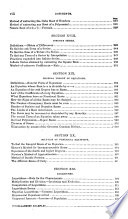 | Joseph Ray - 1852 - 408 pages
...equation is wanting , the sum of the roots is equal to 0. 3. If the 3rd term of any equation is wanting, the sum of the products of the roots, taken two and two in a product, is equal to 0. 4. If the absolute term is wanting, the product of the roots must be 0,... | |
 | Elias Loomis - 1855 - 356 pages
...to the sum of all the roots (1+2+3) with their signs changed. The coefficient of the third term is the sum of the products of the roots taken two and two ; thus, 1X2+1X3+2X3=11. The last term is the product of all the roots (1X2X3) with their signs changed.... | |
 | Benedict Sestini - 1857 - 258 pages
...with regard to the equations 0, . . . = 0, we will have x — t The coefficient B in [e] is equal to the sum of the products of the roots, taken two and two. If we suppose one of the roots wanting, for instance A, the products of the remaining roots, taken... | |
 | Elias Loomis - 1864 - 386 pages
...to the sum of all the roots (1+2+3) with their signs changed. The coefficient of the third term -is the sum of the products of the roots taken two and two ; thus, 1X2+1X3+2X3=11. Ex. 2. Form the equation whose roots are 2, 3, 5, and —6. Ans. x ' —4.K'—29x'+156x—... | |
 | James Robert Christie - 1866 - 428 pages
...second term is the sum of all the roots, with their signs changed. The coefficient of the third term is the sum of the products of the roots, taken two and two, with their signs changed. The coefficient of the fourth term is the sum of the products of the roots,... | |
 | Joseph Ray - 1866 - 420 pages
...coefficient is 0. U. If the 2J term is wanting, the sum of the roots is 0. III. If /lie 3d term is wanting, the sum of the products of the roots, taken two and two in a product, is 0. IV. If the absolute term is wanting, the product of the roots must be 0, and hence... | |
 | Robert Wallace - 1870 - 164 pages
...coefficient of x"— ' is the sum of the roots taken with a negative sign ; the coefficient of x"—- is the sum of the products of the roots taken two and two ; the coefficient of x"—3 is the negative of the sum of the products of the roots taken three and... | |
 | Joseph Ficklin - 1874 - 446 pages
...changed is equal lo the sum of the roots (592, 15, 1C) ; 2. The coefficient of the third term is equal to the sum of the products of the roots, taken two and two ; 3. T7ie coefficient of the fourth term with its sign changed is equal to the sum of the products... | |
 | Michael Angelo McGinnis - 1899 - 207 pages
...again. 331. The coefficients of the second term of the sixth, like all other equations, represents the sum of the products of the roots, taken two and two. These combinations will form five cubic equations, as follows : x3 + (ab + cd + ef) x2 + (abed + dbef+... | |
 | Samuel Marx Barton - 1899 - 224 pages
...«4"- — «„; that is, the sum of the roots with their signs changed ; the coefficient of x"~- is the sum of the products of the roots taken two and two ; the coefficient of x"~3 is the sum of the products of the roots taken three at a time, with their... | |
| |